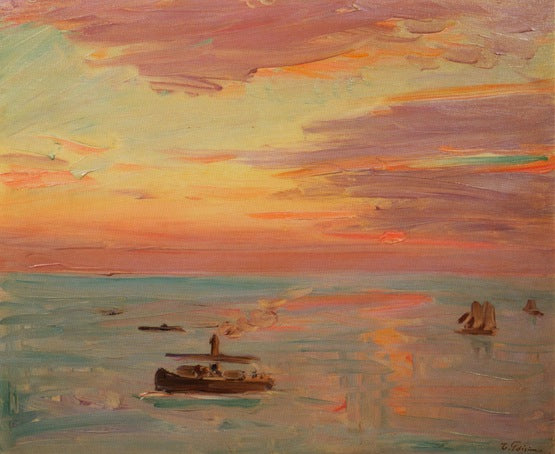תיאור
Fujishima Takeji's "Sunrise at Kobe Harbor" (1935) is a brilliant representation of the Japanese artist's signature modernist approach, a style that integrates elements of Japanese tradition with Western influences. The use of light and color in this painting is particularly fascinating and serves as a gateway to its visual and conceptual complexities.
In this work, the scene is set against the backdrop of Kobe Harbor, framing a specific yet evocative moment of the day. Takeji captures the magical moment of dawn, a natural phenomenon that symbolizes new beginnings. The composition highlights the fusion between the natural and the constructed: the calm water of the harbor is filled with golden and blue reflections that invite the viewer to lose themselves in its calm. The color palette, rich in warm and cool tones, is combined to bring the scene to life. The orange and yellow hues of the sky contrast with the blue and green hues of the water, creating an atmosphere that is both calming and stimulating.
Takeji’s technique in “Sunrise at Kobe Port” reveals his mastery in the use of oil, where texture and stroke combine to draw the viewer into a state of contemplation. The loose, expressive brushwork that characterizes certain elements of the water and boats suggests movement, connecting visual stillness with a sense of temporality. Each boat, painted with attention to detail, seems to have its own narrative, while silhouettes become figures in a landscape that breathes life.
Although there are no explicit human figures in this work, the presence of these boats suggests activity and interaction, resonating with the idea of everyday life in the port. This aspect reflects the importance of Kobe as a cultural and commercial meeting point in Japan, a recurring theme in Takeji's works that seeks to capture the essence of the urban environment and its interrelationship with nature.
Fujishima Takeji is known for his ability to fuse artistic styles, and “Sunrise at Kobe Port” exemplifies this pursuit. His modern aesthetic is inspired by both European Impressionism and traditional Japanese painting, in an attempt to construct a visual language that speaks to the contemporary era of his time. This work, in its ability to evoke the passage of time through light and color, invites us to reflect on the meaning of change and transience, and their place in our collective experience.
By being intensely set against the backdrop of 1930s Japan, Sunrise at Kobe Port can also be seen as a bridge between past and future, a visual argument about how modernity can integrate tradition. It is a testament to Takeji’s admiration for nature and his surroundings, as well as his commitment to an aesthetic evolution that continues to resonate with contemporary artists.
This work, housed at the Kyoto Municipal Museum of Art, unfolds as a masterpiece that transcends not only its time and place, but also its mere elements, leaving us with a sense of wonder and peace that resonates with the viewer long after the eye moves away from the canvas. In “Sunrise at Kobe Port,” Fujishima Takeji manages to capture not just a moment, but a universal emotion that remains relevant in exploring the relationship between humans and their environment.
KUADROS ©, a famous painting on your wall.
Hand-made oil painting reproductions, with the quality of professional artists and the distinctive seal of KUADROS ©.
Painting reproduction service with satisfaction guarantee. If you are not completely satisfied with the replica of your painting, we will refund 100% of your money.

